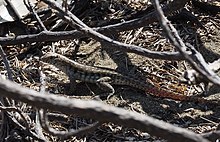| Leiocephalus sixtoi | |
|---|---|

| |
| Scientific classification | |
| Domain: | Eukaryota |
| Kingdom: | Animalia |
| Phylum: | Chordata |
| Class: | Reptilia |
| Order: | Squamata |
| Suborder: | Iguania |
| Family: | Leiocephalidae |
| Genus: | Leiocephalus |
| Species: | L. sixtoi |
| Binomial name | |
| Leiocephalus sixtoi Köhler, Bobadilla , & Hedges, 2016 | |

| |
| Distribution of Leiocephalus sixtoi. Known range in red. | |
Leiocephalus sixtoi, also known as the Hispaniolan dune curlytail, the dune curly-tailed lizard, or Sixto's curly-tailed lizard is a species of lizard in the family Leiocephalidae. This species is endemic to the island of Hispaniola, and is only known in the sandy spaces of monumento natural Las Dunas de las Calderas, also known as Las Dunas de Baní.
Description
This species is similar to L. schreibersii, but is strikingly different in coloration. Males of L. sixtoi have dark gray dorsum and red irises, contrasting with the typical light khaki dorsum and blue irises of L. schreibersii.
L. sixtoi is a diurnal and mostly feeds on terrestrial arthropods.
References
- "Leiocephalus sixtoi". The Reptile Database. Retrieved 2021-03-25.
- ^ Köhler, Gunther; Bobadilla, Marcos J. Rodríguez; Hedges, S. Blair (2016-06-13). "A new dune-dwelling lizard of the genus Leiocephalus (Iguania, Leiocephalidae) from the Dominican Republic". Zootaxa. 4121 (5): 517–532. doi:10.11646/zootaxa.4121.5.2. ISSN 1175-5334. PMID 27395240.
- Schwartz, Albert (1991). Amphibians and reptiles of the West Indies : descriptions, distributions, and natural history. Robert W. Henderson. Gainesville: University of Florida Press. ISBN 0-585-19242-1. OCLC 44958544.
| Taxon identifiers | |
|---|---|
| Leiocephalus sixtoi | |